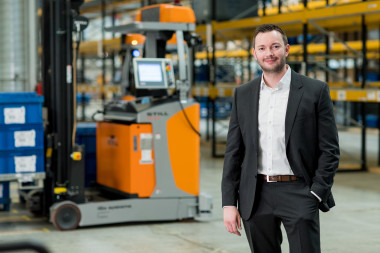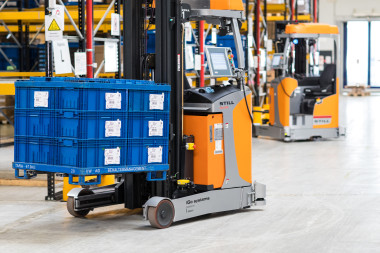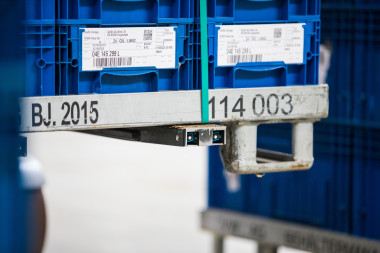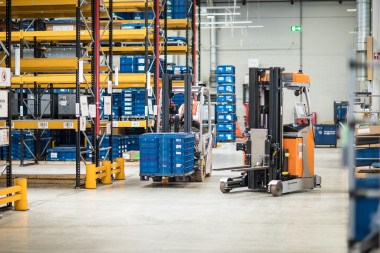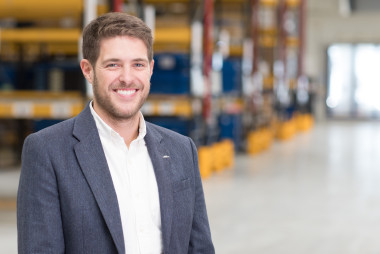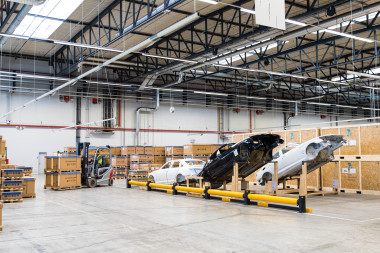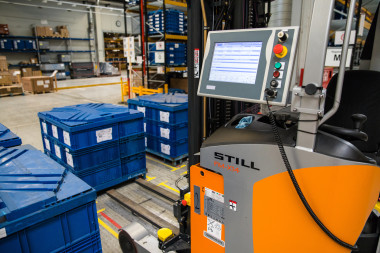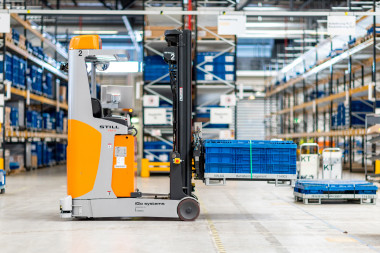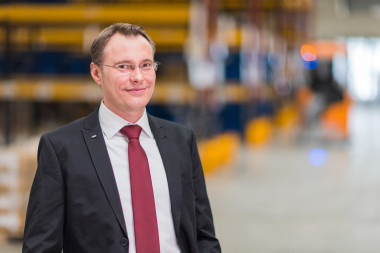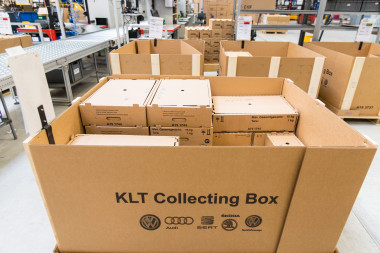Lead through teamwork
Audi.
Sector: Automotive
Company: The Audi Group is present in more than 100 markets worldwide and has around 90,000 employees.
Challenge: Establish efficient, autonomous and stable processes for the worldwide transport of automotive components.
Solution: The reach trucks are recognizing all containers and the IT interfaces are keeping the automated trucks continuously supplied with tasks.
STILL products: STILL FM-X reach trucks with automation technology and vehicle control made by Dematic.
With the advent of smart factories, efficient autonomous processes are becoming increasingly important. But they are also highly complex. STILL has joined forces with KION’s newest brand company, Dematic, to take on this challenge at Audi’s logistics center in Ingolstadt. Initial results a few months into the automation project are positive.
It announces itself with a beep, quiet to begin with, then becoming louder and louder. Finally, the STILL FM-X reach truck appears around a corner at Audi’s logistics center in Ingolstadt in Bavaria. As if steered by an invisible hand, the orange high-tech machine made in Hamburg slowly approaches a blue crate. The truck stops a few centimeters in front of it with its fork off the ground. It almost seems like the reach truck is taking a deep breath before lifting the crate, but in fact the truck’s sensors are scanning the crate and sizing it up. After a brief pause, it determines that this is the correct crate. The FM-X drops its fork to the floor, picks up the crate and places it in the correct space in the rack. “Our job is to transport automotive parts on time and in the right quality around the world, in particular from Europe to China, Mexico, and Brazil,” explains Adam Molnar, head of international logistics at Audi. This includes a complex process from goods inward and warehousing to packing stations and shipping. “Increasing automation and the growing use of digital technologies present many opportunities and potential to make the logistics process more efficient and more stable. We wanted to assess this in the real world,” says Stefan Meier, logistics planner at Audi and project manager for automated reach trucks. The CKD logistics facility in Ingolstadt was chosen as the site to put this to the test. “Not only is the site our CKD center of excellence, but it’s also Audi’s only CKD site that is operated entirely by Audi employees,” Meier explains. CKD stands for ‘completely knocked down’, a production method where vehicles are exported in parts and assembled and sold in the destination country – mainly to avoid high import duties on finished products.
There was a simple reason why STILL was chosen as the strategic partner. “STILL was the only vendor to provide a solution for our complex processes that fully met our requirements,” says Molnar. Patrick Litz, system consultant at STILL, is delighted to hear that: “As Audi’s international and local partner, we’re here to provide support, whether with fleet optimization or with servicing. It’s only logical that we develop concepts together.” Following initial talks in Ingolstadt, a concept was developed with Dematic, the automation and supply chain optimization specialists. The two KION brand companies were able to pool their extensive expertise, resulting in two STILL reach trucks with automation technology and vehicle control made by Dematic. “The synergies; involved provide added value and many advantages for Audi,” Litz says. But it wasn’t all plain sailing: “This project was working with cutting edge technology. Audi had little experience in the field and it was up to the project team to take on
the entire planning process. In addition to the amount of planning involved, the wide range of container types that needed to be handled and the integration into our IT systems presented further challenges,” Meier says. Patrick Litz adds: “Off-the-peg solutions are unsuitable for such a complex project, so working closely with the client to find solutions is essential, especially early on during the concept phase.” The idea finally became a reality at the end of 2017, and trucks are now constantly moving about the warehouse, transporting new containers and placing them in the allocated spaces. A few minutes later, one of the automated reach trucks arrives and takes the container to the rack. Even the top levels in the rack and heavy loads are no longer a problem. Containers are effortlessly lifted five meters high and placed with as much care and attention as at the lower levels. “Our reach trucks are the only ones capable of doing that,” Litz says with pride.
The automated FM-X trucks keep out of the way of the manually driven vehicles, with safety features such as sensors and acoustic signals preventing any collisions. The sensors on the front of the fork also enable the exact positioning of containers. Just a few steps away, Audi employees can monitor the tasks of the automated trucks on screen and change them if required. For example, the battery can be changed every ten hours. At the charging point, the empty battery is removed by an employee and replaced with a fully charged one. The whole procedure takes about five minutes. Once this has been done, the trucks return to the 24 manual packing stations and adjust to the pace of work.
A few months in, the strategic partners are satisfied with progress so far. “The project is going very well. The reach trucks are recognizing all containers correctly and the IT interfaces are keeping the automated trucks continuously supplied with tasks,” Meier says. “We’ve been able to achieve the specified performance for both trucks every day, and at times we’ve even surpassed it. This is undoubtedly down to the excellent collaboration with STILL and Dematic.” Philipp Hoops, project manager at Dematic, is also delighted: “The system has been very stable from the start, with few errors and no breakdowns. We’ve also been able to create a basis for our followup processes and have acquired expertise with interfaces and pallet types that we can apply to new projects.” Litz is also optimistic when it comes to extending the partnership: “Once the pilot project has been completed, Audi is planning a rollout across several warehouses. Following the success of the pilot, we’re looking forward to continuing our partnership and are ready to embark on further projects.” Considering the progress made so far, he is right to be optimistic.

